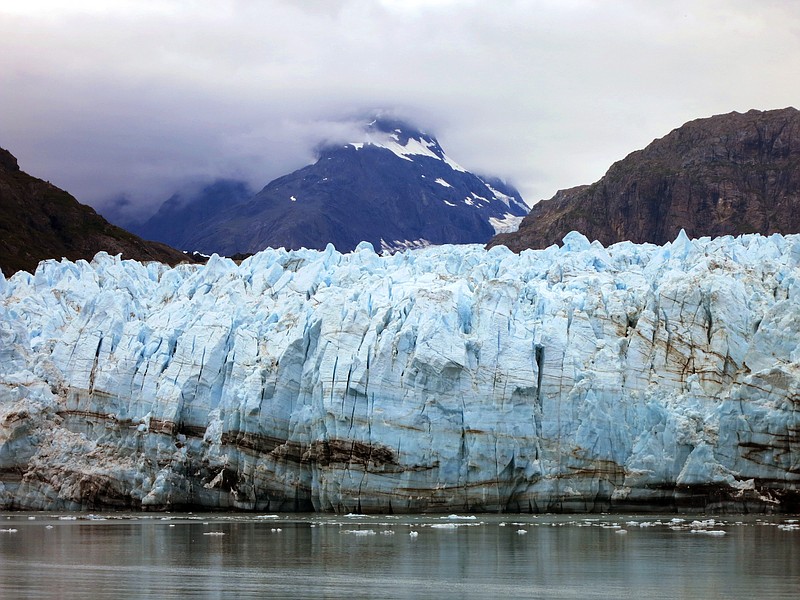It is about time - no, long overdue - that a U.S. president is visiting the melting glaciers of the Arctic and doing a show and tell for Americans who can't quite grasp that climate change is real and life-altering.
President Barack Obama, in his weekly Saturday address, began touting the urgent message he will keep up all week as he travels Alaska and tries to change the national conversation on global warming.
"This is all real. This is happening to our fellow Americans right now," Obama said, noting that Alaskans already are coping with more frequent and extensive wildfires, bigger storm surges as sea ice melts faster, and quickened shoreline erosion - three feet a year in some places.
Obama will try to call attention to Alaska as a kind of climate change ground zero, and he will ask a distracted public to see the harsh effects.
The Arctic has warmed nearly twice as fast as the rest of the world, and parts of northern Alaska have lost what White House senior adviser Brian Deese termed a "football field's worth of land a day" to coastal erosion and sea-level rise. Alaska's independent governor says four Alaskan villages are in "imminent danger" and must be relocated.
Imagine Chattanooga disappearing beneath the Tennessee River so quickly that we could watch and measure it from day to day and year to year.
Wouldn't we be up in arms demanding something be done? Of course we would - but to most of us Alaska (and even closer beaches) are out of sight and out of mind.
The thing is, our world is smaller than we think, and what happens in Alaska's Arctic also happens here - just in a different way. Alaska's main export product after oil and natural gas is seafood, primarily salmon, cod, Pollock and crab.
But foreign policy implications of a changing Arctic also are quickly coming into focus for the Obama administration and Americans: Russia is increasingly staging military exercises there and behaving like a military rival in the area as sea ice breaks up. The Center for Strategic and International Studies, a Washington bipartisan think-tank recently termed the Russian ambitions as "the new ice curtain."
Most Americans may not realize that the United States is an Arctic nation - thanks to the Alaska Purchase when, in 1867, Tennessean and then-president of the United States Andrew Johnson and his secretary of state, William Seward, negotiated to buy 586,412 square miles of land from the Russian Empire for $7.2 million.
Many ridiculed what they called the extravagant purchase (Really? It was 2 cents per acre!) as Johnson's "polar bear garden" and Secretary of State William Seward's "ice box" and "folly." But policy advisers later came to see it as a strategic transaction that effectively halted Russian expansion in the North Pacific, increased the territorial size of the United States by nearly 20 percent, and enriched our country with natural resources and stunning beauty. It also marked America's effort to move forward and heal after the Civil War. (Vice President Johnson became president after Abraham Lincoln was assassinated.)
Now, President Obama has become the first sitting president to visit and see the Alaskan Arctic - "the top of the world" as it is sometimes called. While he's there, he is defending his administration's recent decision to allow Royal Dutch Shell to begin oil and gas drilling in the Chukchi Sea off of Alaska's northwest coast. He says the Shell drilling, which must meet extra-high safety and environmental standards, is part of a balanced energy approach to develop domestic resources of oil and natural gas until more sustainable, alternative fuel sources become the norm.
"I share people's concerns about offshore drilling. I remember the BP spill in the Gulf of Mexico all too well," Obama said in his weekly address.
Let's hope this trip pays off with Americans as a climate doubt-eraser and is more than just an opportunity to put a happy face on Arctic drilling. We don't have time for climate hypocrisy.
July brought us the highest average temperatures globally since record-keeping began. And the first seven months of the year also had all-time highs - making it likely that 2015 will be the hottest year on record, according to the National Oceanic and Atmospheric Administration.
Scientists also just announced that new research indicates at least three feet of global sea level rise by the end of the century is near certain. Three feet is the higher range of the one-to-three feet level predicted in the UN Intergovernmental Panel on Climate Change's 2013 assessment.
This week, we're seeing the first recorded occurrence of three Category 4 hurricanes lined up in the central and eastern Pacific basins at the same time.
Show and tell used to be fun. But that was a different day and time.
